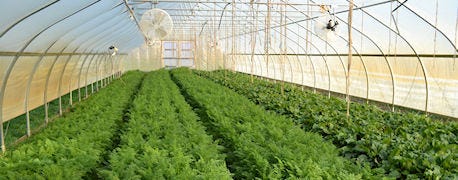February 5, 2013

University of Illinois Extension is offering the Good Agricultural Practices Workshop at several locations this February and March.
These workshops are designed to educate fresh fruit and vegetable producers in food safety practices, which will in turn help keep producers competitive in the marketplace, explains Ellen Phillips, Extension educator for local food systems and small farms.
Phillips says recent produce-associated foodborne illness outbreaks have heightened public awareness of produce food safety and increased the demand by fresh produce buyers to have third party auditors verify farm food safety practices.

U Of I Offers Food Safety Workshops For Fresh Fruit And Vegetable Producers
"More and more, the retail and food service industry are identifying growers who have implemented GAPs and have a verified farm food safety plan," she says. "Producers who attend this workshop can become GAPs-certified."
Phillips adds that a grant from the Illinois Department of Agriculture Specialty Crops will provide cost share to farmers who would like to pursue GAPs certification.
Four workshops are scheduled; the first will be held Feb. 19 in Oregon, Ill. The second will be held on Feb. 27 in Joliet, Ill., the third on March 4 in Urbana, Ill., and the fourth on March 12 in Springfield, Ill. Each workshop runs from 8:30 a.m. to 4 p.m.
Cost per participant is $10 per person and includes lunch and a manual. Pre-registration for each workshop is required one week in advance. Lunch and light refreshments will be provided. To register, go here. For more information on locations and any other questions, call 815-732-2191.
"For fresh fruit and vegetable producers, food safety is particularly important because some of the fresh produce they grow is eaten raw," Phillips notes. "It's critical to be aware of and implement food safety practices so that microbial risks can be minimized."
The issue of foodborne illness prevention and produce safety has national significance as is evidenced by two new food safety rules recently proposed by the U.S. Food and Drug Administration. The first rule would require makers of food to be sold in the United States to develop a formal plan for preventing their food products from causing foodborne illness.
The second rule, which would eventually affect small farm producers, proposes enforceable, science- and risk-based standards for the safe production and harvesting of fruits and vegetables. The proposed rules are available at http://www.fda.gov/Food/FoodSafety/FSMA/ for public comment until May 16.
Phillips says the GAPs workshop will include topics on creating a food safety plan, produce-safety risk factors and impacts, and auditing farms for GAPs/food safety, as well as water-quality testing, soil and manure management, and worker health and hygiene.
"The farmers we work with clearly have a strong dedication to producing the best-quality and safest produce possible," Phillips concludes. "We're here to help them make sure that happens."
A GAPs webinar series will also be offered for those producers unable to attend an in-house seminar. That series will take place on Mondays, April 8 to April 29, from 6 to 8 p.m. There is a $10 fee per participant; pre-registration, along with pre-payment, is required by April 1. Call 815-933-8337 to register by credit card or register online.
You May Also Like




